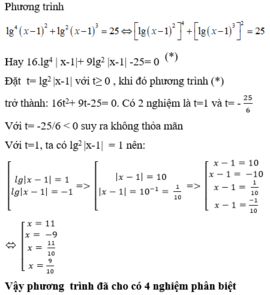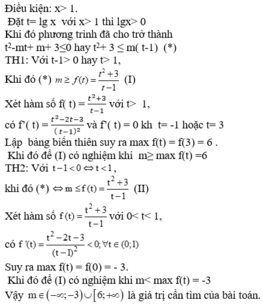
Hãy nhập câu hỏi của bạn vào đây, nếu là tài khoản VIP, bạn sẽ được ưu tiên trả lời.


\(\left(1+\dfrac{1}{2x}\right).lg3+lg2=lg\left(27-3^{\dfrac{1}{x}}\right)\)
\(\Leftrightarrow lg3^{1+\dfrac{1}{2x}}+lg2=lg\left(27-3^{\dfrac{1}{x}}\right)\)
\(\Leftrightarrow lg\left(2.3^{1+\dfrac{1}{2x}}\right)=lg\left(27-3^{\dfrac{1}{x}}\right)\)
\(\Leftrightarrow2.3^{1+\dfrac{1}{2x}}=27-3^{\dfrac{1}{x}}\)
\(\Leftrightarrow2.3.\left(3^{\dfrac{1}{x}}\right)^2=27-3^{\dfrac{1}{x}}\)
Đặt \(3^{\dfrac{1}{x}}=t\left(t>0\right)\) phương trình trở thành:
\(2.3t^2=27-t\)
\(\Leftrightarrow\left[{}\begin{matrix}t_1=\dfrac{-1-\sqrt{649}}{12}\left(l\right)\\t_2=\dfrac{1+\sqrt{649}}{12}\left(tm\right)\end{matrix}\right.\)
Với \(t=\dfrac{-1-\sqrt{649}}{12}\Leftrightarrow3^{\dfrac{1}{x}}=\dfrac{-1-\sqrt{649}}{12}\)
\(\Leftrightarrow\dfrac{1}{x}=log^{\dfrac{-1-\sqrt{649}}{12}}_3\)
\(\Leftrightarrow x=log^3_{\dfrac{-1-\sqrt{649}}{12}}\).

a) Ta có \(\log_32<\log_33=1=\log_22<\log_23\)
b) \(\log_23<\log_24=2=\log_39<\log_311\)
c) Đưa về cùng 1 lôgarit cơ số 10, ta có
\(\frac{1}{2}+lg3=\frac{1}{2}lg10+lg3=lg3\sqrt{10}\)
\(lg19-lg2=lg\frac{19}{2}\)
So sánh 2 số \(3\sqrt{10}\) và \(\frac{19}{2}\) ta có :
\(\left(3\sqrt{10}\right)^2=9.10=90=\frac{360}{4}<\frac{361}{4}=\left(\frac{19}{2}\right)^2\)
Vì vậy : \(3\sqrt{10}<\frac{19}{2}\)
Từ đó suy ra \(\frac{1}{2}+lg3\)<\(lg19-lg2\)
d) Ta có : \(\frac{lg5+lg\sqrt{7}}{2}=lg\left(5\sqrt{7}\right)^{\frac{1}{2}}=lg\sqrt{5\sqrt{7}}\)
Ta so sánh 2 số : \(\sqrt{5\sqrt{7}}\) và \(\frac{5+\sqrt{7}}{2}\)
Ta có :
\(\sqrt{5\sqrt{7}}^2=5\sqrt{7}\)
\(\left(\frac{5+\sqrt{7}}{2}\right)^2=\frac{32+10\sqrt{7}}{4}=8+\frac{5}{2}\sqrt{7}\)
\(8+\frac{5}{2}\sqrt{7}-5\sqrt{7}=8-\frac{5}{2}\sqrt{7}=\frac{16-5\sqrt{7}}{2}=\frac{\sqrt{256}-\sqrt{175}}{2}>0\)
Suy ra : \(8+\frac{5}{2}\sqrt{7}>5\sqrt{7}\)
Do đó : \(\frac{5+\sqrt{7}}{2}>\sqrt{5\sqrt{7}}\)
và \(lg\frac{5+\sqrt{7}}{2}>\frac{lg5+lg\sqrt{7}}{2}\)

Ta có : \(b=lg2=lg\left(\frac{10}{5}\right)=1-lg5\Rightarrow lg5=1-b\)
\(\Rightarrow G=\log_{125b}30=\frac{lg30}{lg125}=\frac{lg\left(3.10\right)}{lg\left(5^3\right)}=\frac{1+lg3}{3lg5}=\frac{1+a}{3\left(1-b\right)}\)

a)ĐK: 2x+1>0
\(\log_3\left(2x+1\right)=2\log_{2x+1}3+1\)
\(\Leftrightarrow log_3\left(2x+1\right)=2.\frac{1}{log_3\left(2x+1\right)}+1\)
Nhân \(log_3\left(2x+1\right)\)cả 2 vế
Đặt \(t=log_3\left(2x+1\right)\)
\(\Leftrightarrow t^2-t-2=0\)
\(\Leftrightarrow\left[\begin{array}{nghiempt}t=2\\t=-1\end{array}\right.\)\(\Leftrightarrow\left[\begin{array}{nghiempt}2x+1=9\\2x+1=\frac{1}{3}\end{array}\right.\)\(\Leftrightarrow\left[\begin{array}{nghiempt}x=4\\x=-\frac{1}{3}\end{array}\right.\)nhận cả 2 nghiệm
b)ĐK x>0
\(\Leftrightarrow1+log^2_{27}x=\frac{10}{3}log_{27}x\)
Đặt \(t=log_{27}x\)
\(\Leftrightarrow t^2-\frac{10}{3}t+1=0\)
\(\Leftrightarrow\left[\begin{array}{nghiempt}t=3\\t=\frac{1}{3}\end{array}\right.\)\(\left[\begin{array}{nghiempt}x=27^3\\x=3\end{array}\right.\)

Chọn D.



<=> x = 4
Vậy phương trình đã cho có nghiệm duy nhất là x= 4

